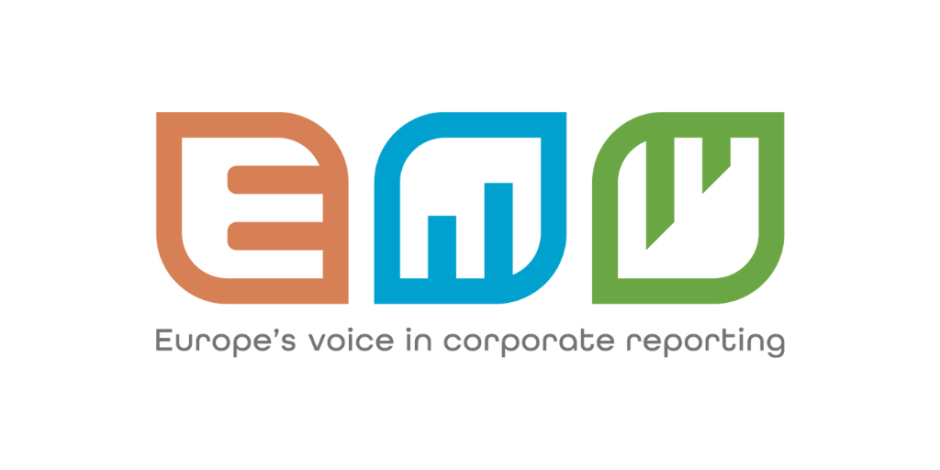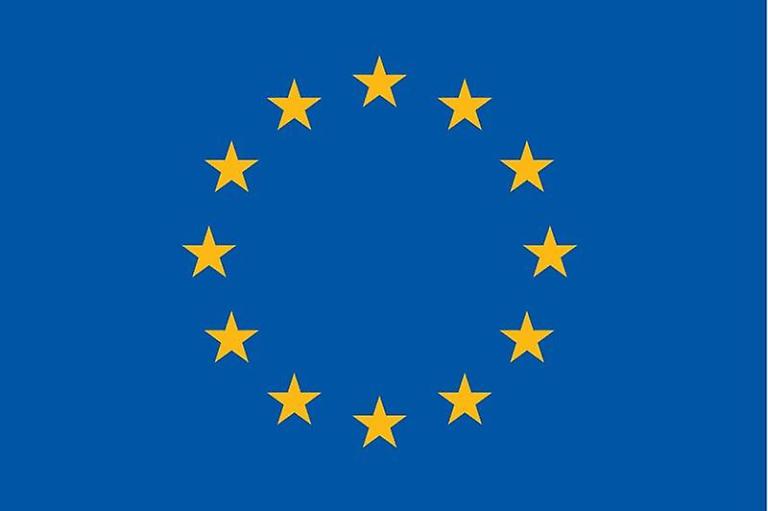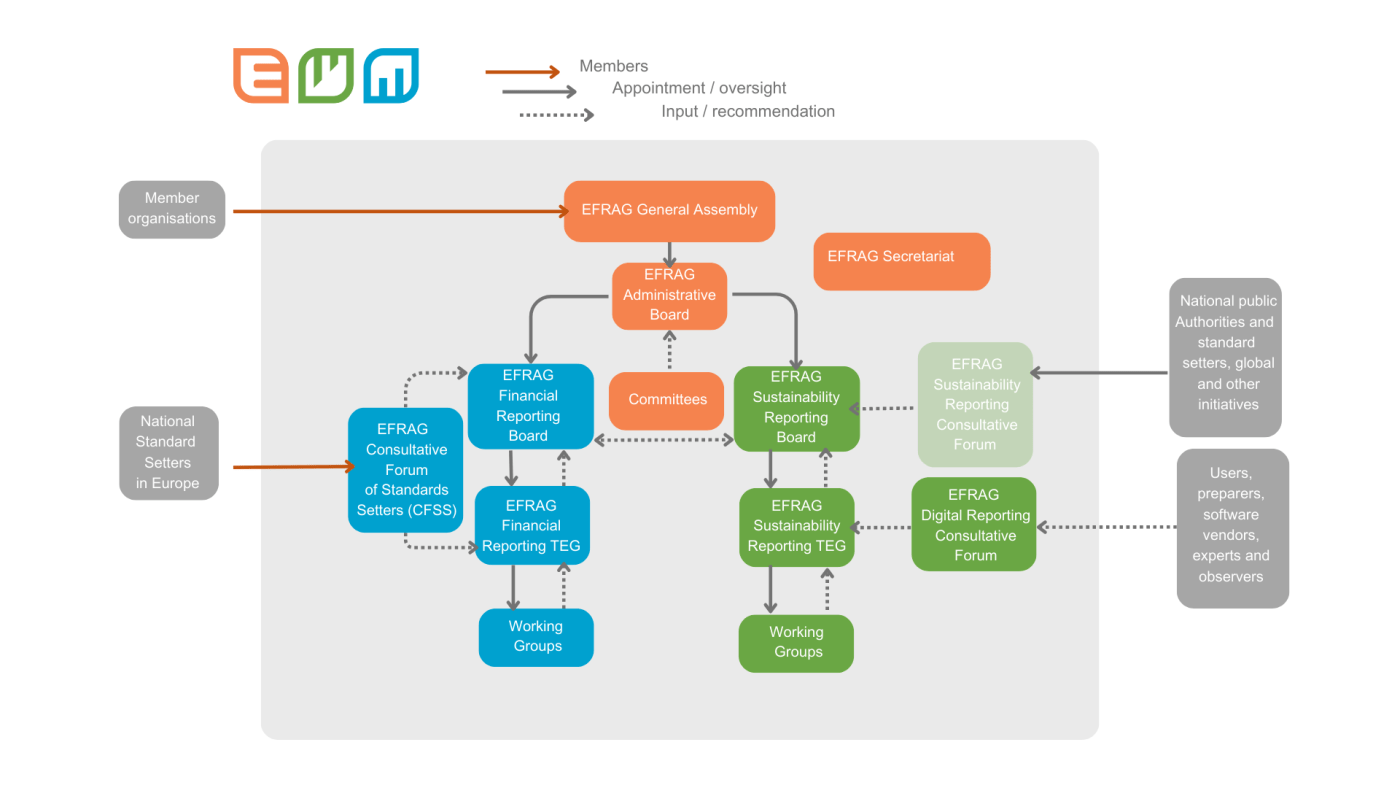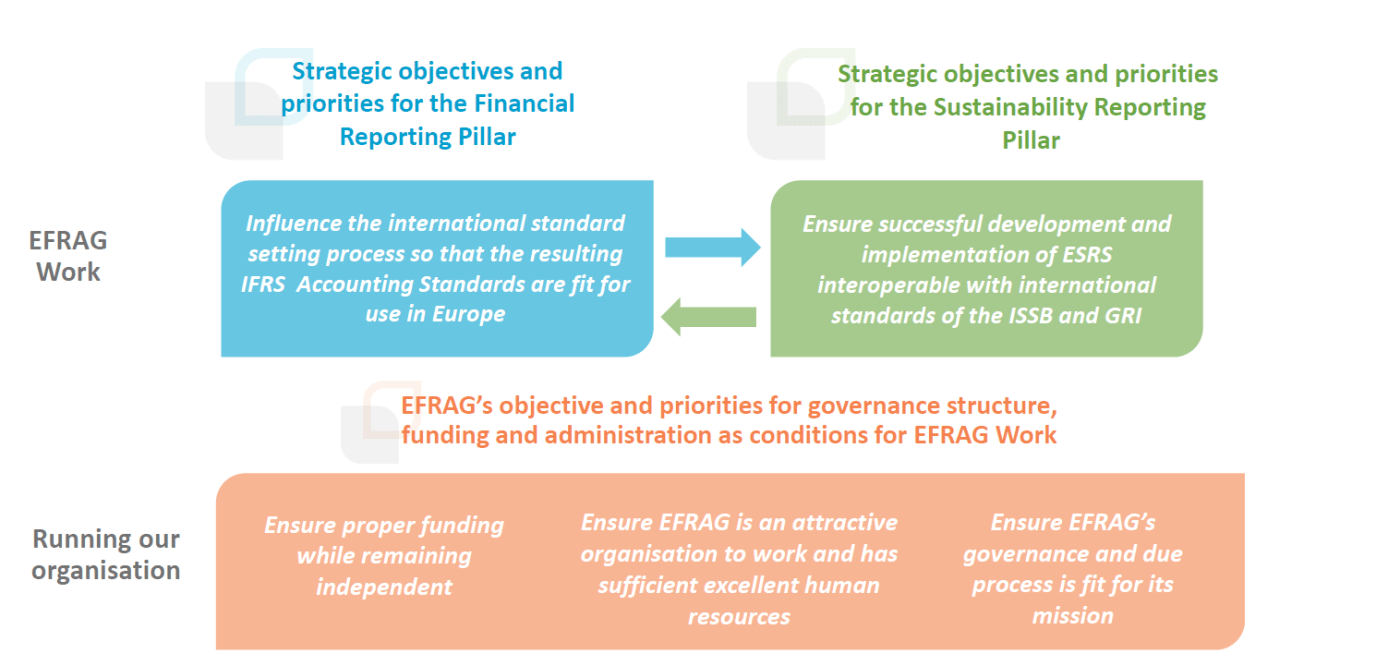About us
General Presentation
EFRAG is a private association established in 2001 with the encouragement of the European Commission to serve the public interest. EFRAG extended its mission in 2022 following the new role assigned to EFRAG in the CSRD, providing Technical Advice to the European Commission in the form of draft European Sustainability Reporting Standards and/or draft amendments to these Standards. Its Member Organisations are European Stakeholders Organisations, National Organisations and Civil Society Organisations. EFRAG’s activities are organised in two pillars:
- A Financial Reporting Pillar: influencing the development of IFRS Accounting Standards from a European perspective and how they contribute to the efficiency of capital markets and providing endorsement advice on (amendments to) IFRS Accounting Standards to the European Commission.
- Secondly, a Sustainability Reporting Pillar: developing draft European Sustainability Reporting Standards (ESRS), and related amendments for the European Commission and providing implementation support for ESRS.

Mission statement
EFRAG’s mission is to serve the European public interest in both financial and sustainability reporting by developing and promoting European views in the field of corporate reporting. EFRAG builds on and contributes to the progress in corporate reporting.
In its financial reporting activities, EFRAG ensures that the European views are properly considered in the IASB’s standard-setting process and in related international debates. EFRAG ultimately provides advice to the European Commission on whether newly issued or amended IFRS Accounting Standards meet the criteria of the IAS Regulation for endorsement for use in the EU, including whether endorsement would be conducive to the European public good.
In its sustainability reporting activities, EFRAG provides technical advice to the European Commission in the form of draft European Sustainability Reporting Standards (ESRS) elaborated under a robust due process and supports the effective implementation of ESRS.
EFRAG seeks input from all stakeholders and obtains evidence about specific European circumstances throughout the standard-setting process. Its legitimacy is built on excellence, transparency, governance, due process, public accountability and thought leadership. This enables EFRAG to speak convincingly, clearly, and consistently, and be recognised as the European voice in corporate reporting and a contributor to global progress in corporate reporting.
Public accountability
Public accountability is ensured on the one hand by EFRAG's governance and on the other by EFRAG's due process. EFRAG is accountable to the public at large and the European institutions through its open and transparent due process ( including public consultation on its positions); the transparency of EFRAG's work; and the public meetings of:
- the Financial Reporting and Sustainability Reporting Boards;
- the EFRAG Financial Reporting and Sustainability Reporting Technical Expert Groups;
- their public agenda papers and open nomination processes.
EFRAG publishes an Annual Review yearly discussing its activities and presenting the audited financials of the past year. The funding by the European Commission brings enhanced scrutiny of EFRAG's activities and expenses, including detailed activity reports to the European Commission.
Funding of EFRAG
EFRAG's funding originates from both the public sector (the European Union) and the private sector (EFRAG Member Organisations). Funding by the European Commission is granted through yearly grant agreements. Funding by the Member Organisations includes both contributions in cash (provided to EFRAG in accordance with EFRAG's statutes), in-kind secondments to the EFRAG technical staff and other forms of in-kind contributions (membership of various groups –EFRAG Administrative Board, EFRAG Financial Reporting and Sustainability Reporting Boards, EFRAG Financial Reporting and Sustainability Reporting TEGs, and their working groups, advisory panels, and project task forces). The EFRAG Administrative Board President and EFRAG Financial Reporting and Sustainability Reporting Chairs may be remunerated. The EFRAG Financial Reporting and Sustainability Reporting TEG Chairs and CEO are employees of EFRAG.
EFRAG is co-funded by the European Union through the Single Market Programme in which the EEA-EFTA countries (Norway, Iceland and Liechtenstein), as well as Kosovo participate. Any views and opinions expressed are however those of the presenter only and do not necessarily reflect those of the European Union, the European Commission or of countries that participate in the Single Market Programme. Neither the European Union, the European Commission nor countries participating in the Single market Programme can be held responsible for them.

EFRAG Strategy 2024-2027
The EFRAG organisation is growing as a result of its expanded mission, including a new pillar on sustainability reporting, an expanded governance structure, an extended membership, an increased staff base, and new topics in the work plan such as connectivity. These changes represent a significant expansion of EFRAG's activities and they pose new challenges and opportunities for EFRAG and set new conditions for the success of EFRAG.
As Europe's voice in corporate reporting, EFRAG's overall objective is to further develop its thought leadership and key contributions to the development of high-quality corporate reporting in Europe and worldwide. This objective is fundamental to allow the consensus views of relevant European stakeholders to be heard in the process. This leads to the European public interest being considered in the international corporate reporting debate and standard setting process and supports the achievement of European policy goals.
EFRAG's 2024-2027 Strategy outlines specific goals and objectives to be achieved in the next four years and serves as a roadmap for EFRAG to navigate through the challenging and rapidly changing environment. This Strategy will, among other things, guide and help EFRAG in identifying priorities, deciding on how to use its resources efficiently, and making informed decisions. It will also help all those working with EFRAG (i.e., EFRAG Member Organisations, working groups, staff, etc) understand what EFRAG wants to achieve and, consequently, align efforts towards common targets and goals.
The EFRAG 2024-2027 Strategy is divided into two main areas:
- Strategic objectives and priorities related to EFRAG's technical work and advice to the European Commission, which encompasses a financial reporting and sustainability reporting pillar.
- Objectives and priorities related to EFRAG's governance structure, funding and administration as conditions for EFRAG's technical work and advice to the European. These will help in ensuring that future IFRS Accounting Standards are endorsed and European Sustainability Reporting Standards (ESRS) are developed using an inclusive and rigorous due process and that EFRAG is an attractive organisation to work for now and in the future. These goals and objectives are particularly important so that EFRAG can effectively manage the aftermath of its governance reform, which integrated the sustainability reporting pillar into the EFRAG governance structure.
The EFRAG Strategy 2024-2027 is available here.
Building strong influence beyond the borders of Europe
Financial Reporting Activities
EFRAG is a member of the IFRS Accounting Standards Advisory Forum (ASAF) and has bilateral relationships with regional or national groups interested and involved in IFRS development. EFRAG also participates in the World Standard Setters meeting. Whilst EFRAG's draft comment letters are published as a basis for EFRAG's due process in Europe, it is widely acknowledged that they attract interest way beyond Europe.
Furthermore, EFRAG enjoys a constructive relationship with the IASB in many ways: EFRAG welcomes IASB members and staff as observers to the EFRAG Financial Reporting TEG and its Working Group meetings; EFRAG staff cooperates with the IASB staff on a frequent basis; the IASB participates in outreach events and field-testing organised by EFRAG in partnership with National Standard Setters in Europe and European stakeholder Organisations; and EFRAG and IASB leadership meet privately on a regular basis.
Sustainability Reporting Activities
EFRAG is a member of the IFRS Sustainability Standards Advisory Forum (SSAF)and has bilateral relationships with regional or national groups interested and involved in sustainability reporting development.
EFRAG staff cooperates with the ISSB staff on a frequent basis and EFRAG and ISSB leadership meet privately on a regular basis.
EFRAG and GRI published in September 2023 a joint statement 0n the high level of interoperability achieved between ESRS and the GRI standards. Entities reporting under ESRS are considered as reporting with reference to the GRI Standards.
EFRAG and the ISSB publish ed interoperability guidance in May 2024 llustrating the high level of alignment achieved between the ISSB Standards and ESRS and how a company can apply both sets of standards, including detailed analysis of the alignment in climate-related disclosures.
EFRAG and TNFD published in June 2024 a mapping of the correspondence between ESRS and the TNFD’s recommended disclosures and metrics illustrating the high level of communality achieved.
EFRAG entered into cooperation agreements with CEN-CENELEC, CDP, EFFAS (European Federation of Financial Analysts), GRI (Global Reporting Iniative) and TNFD (Taskforce on Nature-related Financial Disclosures).
Corporate Reporting Activities
EFRAG is a member of the International Forum of Accounting Standard Setters (IFASS) which addresses both financial and sustainability reporting. EFRAG provides the Chairmanship and technical secretariat support for the period April 2022 – March 2025 of IFASS. IFASS is chaired by the EFRAG Sustainability Reporting TEG Chairwoman.
The EFRAG CEO is a member of the IFRS Advisory Council (formal strategic advisory body to the Trustees of the IFRS Foundation, IASB and the ISSB), which provides strategic support and advice to the IFRS Foundation.

